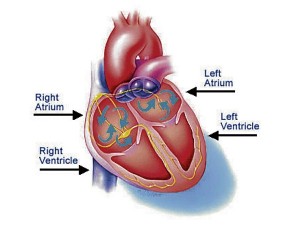New hope for patients with heart rhythm woes

ATRIAL fibrillation is associated with a major risk of stroke, caused by a clot that forms within the left atrium that could travel and block cerebral artery.
Our heart needs to beat steadily and rhythmically. However, because of abnormalities or damage to the heart’s structure, this rhythm could be disrupted.
Such “glitch” in the heart’s electrical system makes the upper chambers, also called the atria, to contract very fast and irregularly (fibrillate).
This causes the lower chambers or the ventricles to beat irregularly.
Atrial fibrillation is considered to be the precursor to various serious cardiovascular complications such as stroke as well as systemic embolism. In fact, the likelihood of strokes in patients suffering from atrial fibrillation increases by about five times.
Approval
Bayer HealthCare, the healthcare and medical products arm of German chemicals and pharmaceuticals giant, Bayer, announced the approval of once-daily rivaroxaban to reduce this risk of stroke and systemic embolism.
Rivaroxaban is currently the only orally taken anticoagulant—an agent used to prevent the formation of blood clots—approved by the United States’ Food and Drug Administration to protect patients with nonvalvular atrial fibrillation.
Bayer HealthCare added that rivaroxaban (Xarelto) is formulated to be taken once a day and that there is no more need for routine blood monitoring, two important considerations when a patient is required to be on medication for longer period.
“As a commonly occurring cardiac rhythm disturbance, atrial fibrillation is gradually becoming an expensive medical ailment, placing a significant burden on hospitals, healthcare providers, and of course patients,” said Reynaldo Cutanda, Bayer Philippines corporate communications manager.
Rivaroxaban is approved to reduce the risk of stroke and systemic embolism in patients with nonvalvular atrial fibrillation at a dose of 20 mg once daily, or 15 mg once daily for patients with moderate to severe renal impairment.
The FDA approval is based on the global clinical trial Rivaroxaban Once daily oral direct Factor Xa inhibition Compared with vitamin K antagonism for prevention of stroke and Embolism Trial in Atrial Fibrillation (Rocket-AF) published this year in The New England Journal of Medicine.
Cutanda noted that once approved here in the Philippines, doctors would be given new option to reduce stroke risk in patients who are living with atrial fibrillation, and the continuous threat of serious strokes.
Multiple medicines
Currently, patients with atrial fibrillation are required to take multiple medicines that may worsen compliance as well as the risk of more if not serious side effects.
Atrial fibrillation affects more than 6 million people in Europe, more than 2.2 million people in the United States and more than 800,000 individuals in Japan.
Common conditions such as high blood pressure, diabetes, and prior stroke, along with being over the age of 75, are factors that further increase the risk of stroke in people living with atrial fibrillation.














